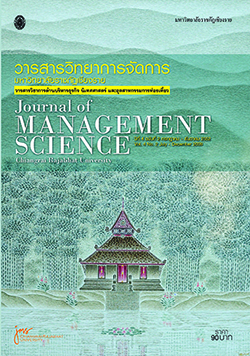The Impact of Fuel Price toward Inflation and Consumption of Chiangrai Consumers
Main Article Content
Abstract
This research aims to study 1) Fuel price circumstance in Thailand 2) The impact of fuel price toward Chiangrai and Thailand’s inflation rate and 3) The impact of fuel price toward consumption of Chiangrai consumers and Thai consumers. The data analysis was firstly done by the collection of secondary data which led to the construction of an economics model. The primary data was consequently collected by using 400 sets of questionnaires. The data collected was accordingly analyzed by a statistical program in order to find frequency, percentage, average point and standard deviation while the Multiple Regression and Simple Regression techniques were used in the statistic prediction. The result was revealed that the price of all fuel, especially Gasohol 91, has the positive impact on inflation rate in Chiangrai and all over Thailand. Furthermore, it gives the negative impact on consumption of Chiangrai and Thai Consumers. This could be concluded that the rise of fuel price reduces the consumption of Chiangrai and Thai citizens, however, this is less than 1 level. In other words, a few reduction of consumption may occur if the fuel price is increased since it is the essential product in their daily lives. Particularly in Chiangrai, the most sensitive expenditure toward the change of fuel price are those of food cost, cigarettes and alcoholic drinks, travelling, communication, taxes and financial fees. On the other hand, the least effected costs are the expenditure for home services and the cost of special affair. Finally, in case of the rise of fuel price, the consumers are compliant to cut down these expenditures respectively; food cost and cigarettes and alcoholic drinks are the first choices while taxes and financial fees are the second choices and lastly, lottery and other kinds of gambling.
Article Details
Views and opinions expressed in the journal do not necessarily reflect those of the editors.


